Karl Gerok | |
|---|---|
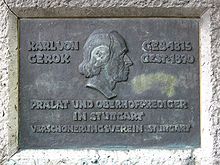 Memorial plaque at gravesite |
Karl Gerok (January 30, 1815 Vaihingen - January 14, 1890 Stuttgart) was a German preacher and religious poet.
Karl Gerok | |
|---|---|
 Memorial plaque at gravesite |
Karl Gerok (January 30, 1815 Vaihingen - January 14, 1890 Stuttgart) was a German preacher and religious poet.
He studied at Tübingen, and became chief court preacher and chief consistorial councillor in Stuttgart in 1868.
His sermons, and particularly his religious poetry, were much admired. The chief collection of the latter is entitled Palmblätter (“Palm leaves,” 1857; 17th ed., 1871). It was translated into English by Brown (London, 1869). This and Pfingstrosen (“Pentecost roses,” 4th ed., 1870) made him famous. He also published Blumen und Sternen (“Flowers and stars,” 3rd ed., 1870) and, during the Franco-Prussian War of 1870-71, patriotic effusions under the title of Deutsche Ostern (“German Easter”).
This article includes a list of references, related reading or external links, but its sources remain unclear because it lacks inline citations .(July 2015) |

Philip Schaff was a Swiss-born, German-educated Protestant theologian and ecclesiastical historian, who spent most of his adult life living and teaching in the United States.

Friedrich August Gottreu Tholuck, known as August Tholuck, was a German Protestant theologian, pastor, and historian, and church leader.
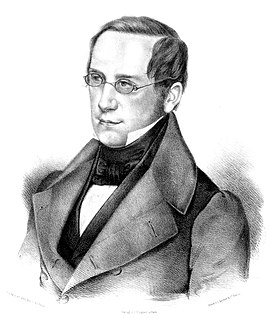
Julius Müller was a German Protestant theologian.
Karl Rudolf Hagenbach was a Swiss church theologian and historian. He was particularly interested in the Protestant Reformation and its figures.

Wilhelm Adolf Schmidt was a German historian.
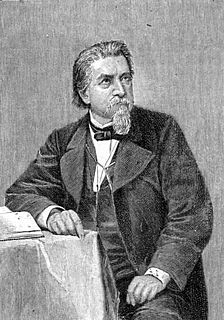
Karl Ferdinand Gutzkow was a German writer notable in the Young Germany movement of the mid-19th century.

Arnold Ruge was a German philosopher and political writer. He was the older brother of Ludwig Ruge.

Johannes von Miquel was a German statesman.

Vaihingen an der Enz is a town located between Stuttgart and Karlsruhe, in southern Germany, on the western periphery of the Stuttgart Region. Vaihingen is situated on the river Enz, and has a population of around 30,000. The former district-capital is now part of the district of Ludwigsburg in the Land (state) of Baden-Württemberg. It is 25 km northwest of Stuttgart, and 15 km west of Ludwigsburg. Not to be confused with Vaihingen, a district of Stuttgart.

The Kingdom of Württemberg was a German state that existed from 1805 to 1918, located within the area that is now Baden-Württemberg. The kingdom was a continuation of the Duchy of Württemberg, which existed from 1495 to 1805. Prior to 1495, Württemberg was a county in the former Duchy of Swabia, which had dissolved after the death of Duke Conradin in 1268.

Ludwig von Löfftz was a German genre and landscape painter.

The State University of Music and Performing Arts Stuttgart is a professional school for musicians and performing artists in Stuttgart, Germany. Founded in 1857, it is one of the oldest schools of its kind in Germany.
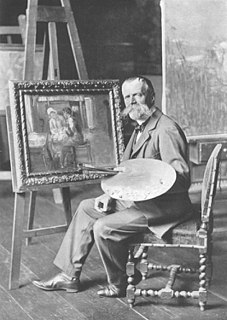
Fritz von Uhde was a German painter of genre and religious subjects. His style lay in-between Realism and Impressionism, he was once known as "Germany's outstanding impressionist" and he became one of the first painters to introduce plein-air painting in his country.

Friedrich von Schmidt was an architect who worked in late 19th century Vienna.
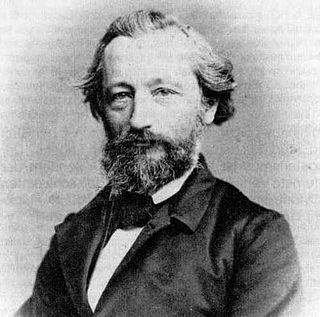
Wilhelm Eduard Baltzer was the founder of the first German vegetarian society, the German Natural Living Society, a supporter of the Revolution of 1848 in Germany and an early popularizer of science.

Albert Knapp was a German poet and animal welfare activist.
Karl Ludwig Wilhelm Gerok was a German organist, composer and organ teacher.
Friedrich von Gerok was a German theologian.

Karl Christof Friedrich von Gerok was an officer of Württemberg, general of the infantry of the XXIV Reserve Corps during World War I.
Martin Rößler, also Martin Rössler, is a German church musician, Protestant theologian, music director and university lecturer in Tübingen.